Uber & Airbnb: Case Study of On-Demand Economy & Location Marketing
VerifiedAdded on 2023/05/30
|7
|1158
|108
Case Study
AI Summary
This case study examines the on-demand economy, focusing on how organizations like Uber and Airbnb operate using its principles and location-based marketing. It defines the on-demand economy as an economic activity facilitated by digital marketplaces, providing consumers with immediate access and convenience. The study highlights the importance of location-based marketing, involving online and offline tactics tailored to consumers' geographic locations, and its role in promoting products in competitive markets. Uber and Airbnb are analyzed as prime examples of companies effectively using location-based services to meet consumer demands in different geographical areas, tailoring their strategies to specific regions. The analysis concludes that the on-demand economy is directly linked to location-based marketing, enabling organizations to operate profitably by targeting consumers based on their preferences and location.
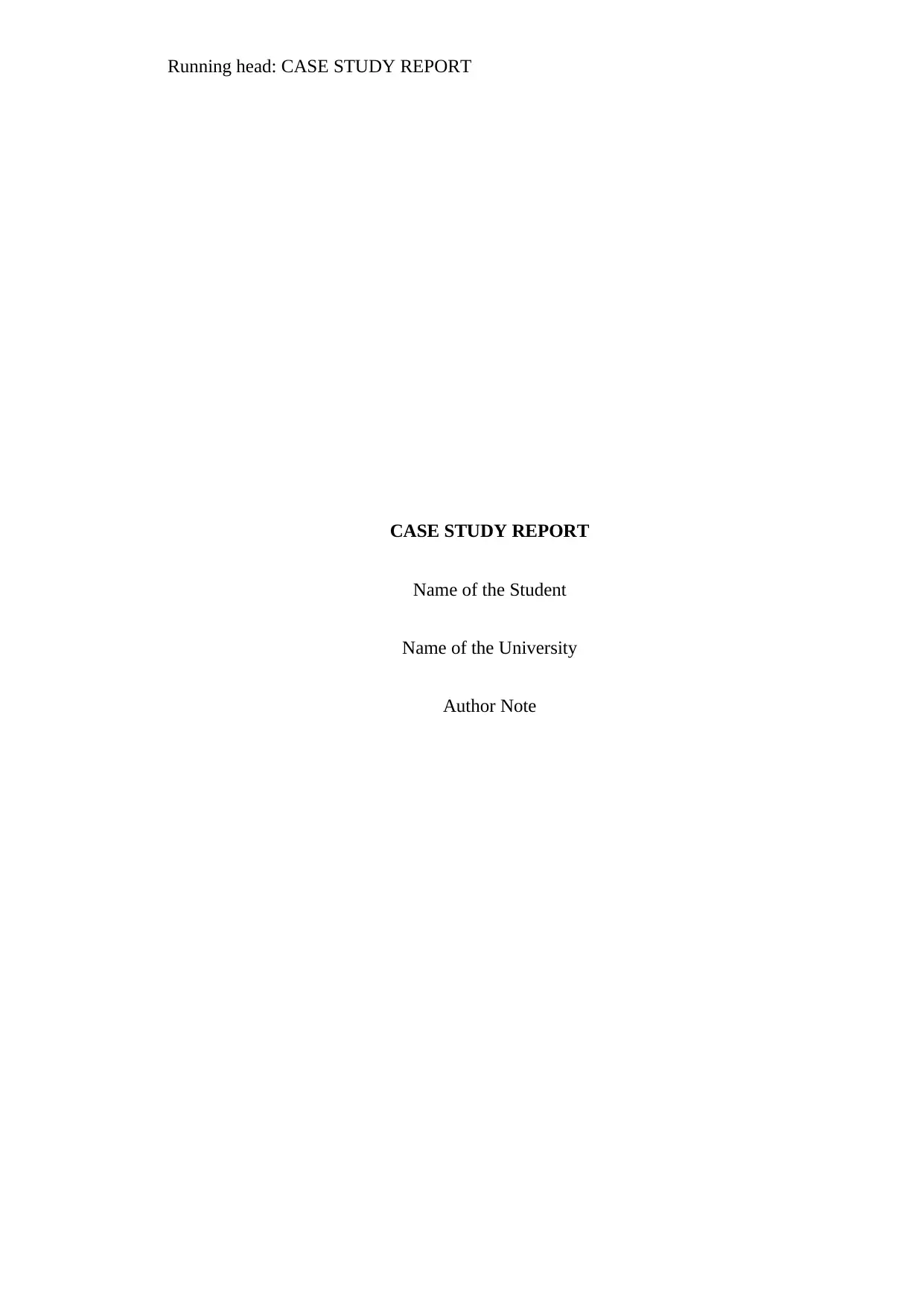
Running head: CASE STUDY REPORT
CASE STUDY REPORT
Name of the Student
Name of the University
Author Note
CASE STUDY REPORT
Name of the Student
Name of the University
Author Note
Paraphrase This Document
Need a fresh take? Get an instant paraphrase of this document with our AI Paraphraser
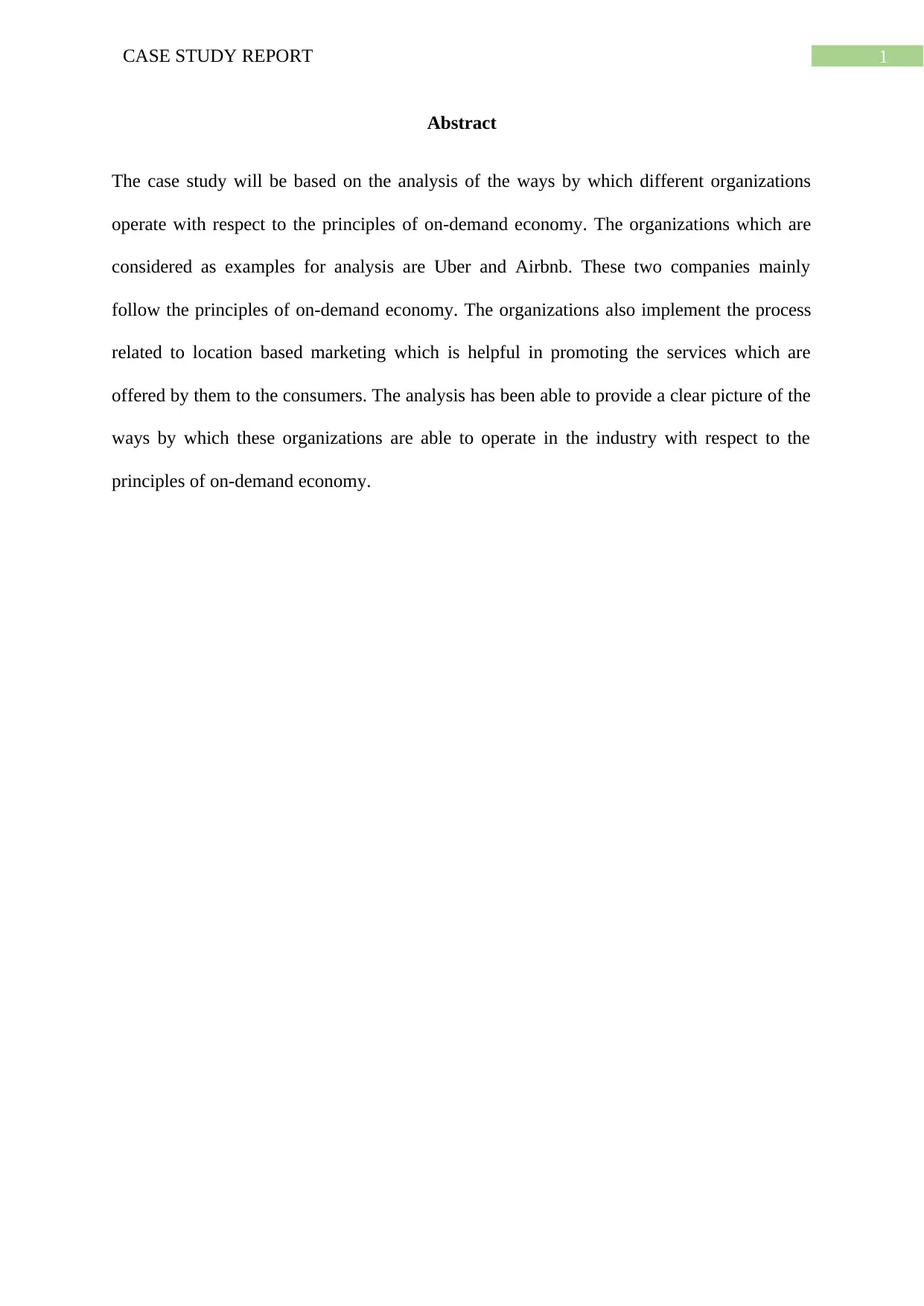
1CASE STUDY REPORT
Abstract
The case study will be based on the analysis of the ways by which different organizations
operate with respect to the principles of on-demand economy. The organizations which are
considered as examples for analysis are Uber and Airbnb. These two companies mainly
follow the principles of on-demand economy. The organizations also implement the process
related to location based marketing which is helpful in promoting the services which are
offered by them to the consumers. The analysis has been able to provide a clear picture of the
ways by which these organizations are able to operate in the industry with respect to the
principles of on-demand economy.
Abstract
The case study will be based on the analysis of the ways by which different organizations
operate with respect to the principles of on-demand economy. The organizations which are
considered as examples for analysis are Uber and Airbnb. These two companies mainly
follow the principles of on-demand economy. The organizations also implement the process
related to location based marketing which is helpful in promoting the services which are
offered by them to the consumers. The analysis has been able to provide a clear picture of the
ways by which these organizations are able to operate in the industry with respect to the
principles of on-demand economy.
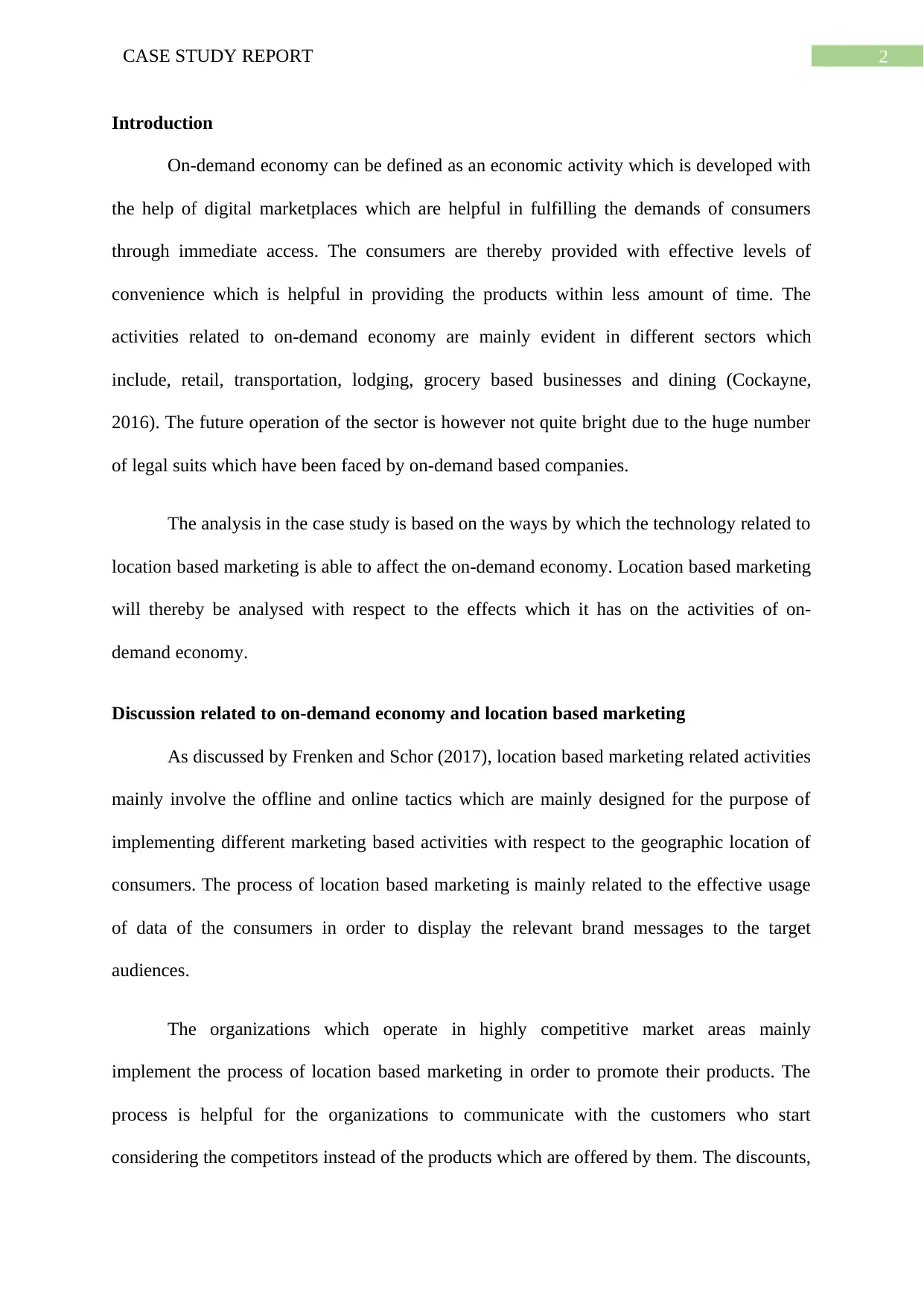
2CASE STUDY REPORT
Introduction
On-demand economy can be defined as an economic activity which is developed with
the help of digital marketplaces which are helpful in fulfilling the demands of consumers
through immediate access. The consumers are thereby provided with effective levels of
convenience which is helpful in providing the products within less amount of time. The
activities related to on-demand economy are mainly evident in different sectors which
include, retail, transportation, lodging, grocery based businesses and dining (Cockayne,
2016). The future operation of the sector is however not quite bright due to the huge number
of legal suits which have been faced by on-demand based companies.
The analysis in the case study is based on the ways by which the technology related to
location based marketing is able to affect the on-demand economy. Location based marketing
will thereby be analysed with respect to the effects which it has on the activities of on-
demand economy.
Discussion related to on-demand economy and location based marketing
As discussed by Frenken and Schor (2017), location based marketing related activities
mainly involve the offline and online tactics which are mainly designed for the purpose of
implementing different marketing based activities with respect to the geographic location of
consumers. The process of location based marketing is mainly related to the effective usage
of data of the consumers in order to display the relevant brand messages to the target
audiences.
The organizations which operate in highly competitive market areas mainly
implement the process of location based marketing in order to promote their products. The
process is helpful for the organizations to communicate with the customers who start
considering the competitors instead of the products which are offered by them. The discounts,
Introduction
On-demand economy can be defined as an economic activity which is developed with
the help of digital marketplaces which are helpful in fulfilling the demands of consumers
through immediate access. The consumers are thereby provided with effective levels of
convenience which is helpful in providing the products within less amount of time. The
activities related to on-demand economy are mainly evident in different sectors which
include, retail, transportation, lodging, grocery based businesses and dining (Cockayne,
2016). The future operation of the sector is however not quite bright due to the huge number
of legal suits which have been faced by on-demand based companies.
The analysis in the case study is based on the ways by which the technology related to
location based marketing is able to affect the on-demand economy. Location based marketing
will thereby be analysed with respect to the effects which it has on the activities of on-
demand economy.
Discussion related to on-demand economy and location based marketing
As discussed by Frenken and Schor (2017), location based marketing related activities
mainly involve the offline and online tactics which are mainly designed for the purpose of
implementing different marketing based activities with respect to the geographic location of
consumers. The process of location based marketing is mainly related to the effective usage
of data of the consumers in order to display the relevant brand messages to the target
audiences.
The organizations which operate in highly competitive market areas mainly
implement the process of location based marketing in order to promote their products. The
process is helpful for the organizations to communicate with the customers who start
considering the competitors instead of the products which are offered by them. The discounts,
⊘ This is a preview!⊘
Do you want full access?
Subscribe today to unlock all pages.

Trusted by 1+ million students worldwide
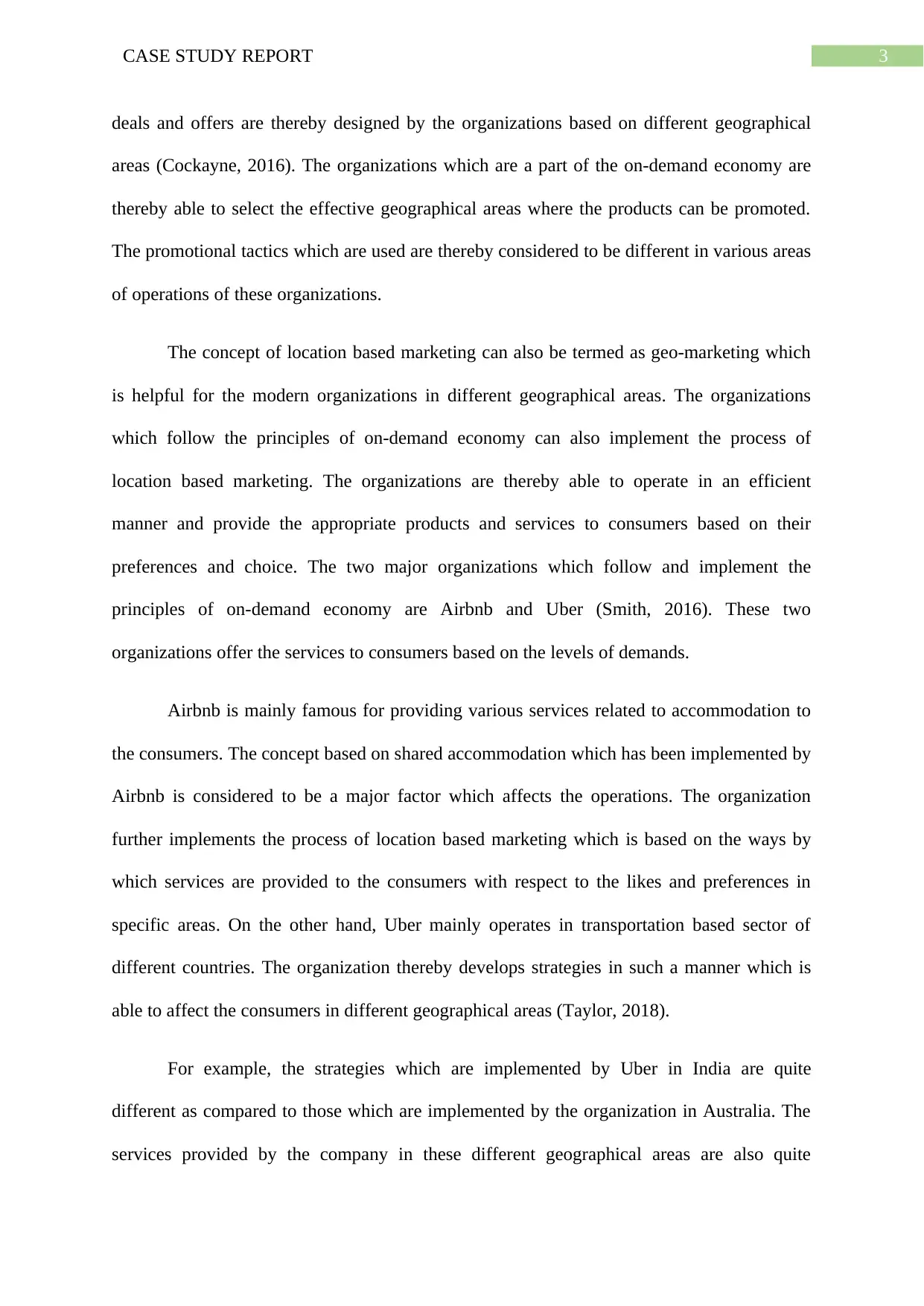
3CASE STUDY REPORT
deals and offers are thereby designed by the organizations based on different geographical
areas (Cockayne, 2016). The organizations which are a part of the on-demand economy are
thereby able to select the effective geographical areas where the products can be promoted.
The promotional tactics which are used are thereby considered to be different in various areas
of operations of these organizations.
The concept of location based marketing can also be termed as geo-marketing which
is helpful for the modern organizations in different geographical areas. The organizations
which follow the principles of on-demand economy can also implement the process of
location based marketing. The organizations are thereby able to operate in an efficient
manner and provide the appropriate products and services to consumers based on their
preferences and choice. The two major organizations which follow and implement the
principles of on-demand economy are Airbnb and Uber (Smith, 2016). These two
organizations offer the services to consumers based on the levels of demands.
Airbnb is mainly famous for providing various services related to accommodation to
the consumers. The concept based on shared accommodation which has been implemented by
Airbnb is considered to be a major factor which affects the operations. The organization
further implements the process of location based marketing which is based on the ways by
which services are provided to the consumers with respect to the likes and preferences in
specific areas. On the other hand, Uber mainly operates in transportation based sector of
different countries. The organization thereby develops strategies in such a manner which is
able to affect the consumers in different geographical areas (Taylor, 2018).
For example, the strategies which are implemented by Uber in India are quite
different as compared to those which are implemented by the organization in Australia. The
services provided by the company in these different geographical areas are also quite
deals and offers are thereby designed by the organizations based on different geographical
areas (Cockayne, 2016). The organizations which are a part of the on-demand economy are
thereby able to select the effective geographical areas where the products can be promoted.
The promotional tactics which are used are thereby considered to be different in various areas
of operations of these organizations.
The concept of location based marketing can also be termed as geo-marketing which
is helpful for the modern organizations in different geographical areas. The organizations
which follow the principles of on-demand economy can also implement the process of
location based marketing. The organizations are thereby able to operate in an efficient
manner and provide the appropriate products and services to consumers based on their
preferences and choice. The two major organizations which follow and implement the
principles of on-demand economy are Airbnb and Uber (Smith, 2016). These two
organizations offer the services to consumers based on the levels of demands.
Airbnb is mainly famous for providing various services related to accommodation to
the consumers. The concept based on shared accommodation which has been implemented by
Airbnb is considered to be a major factor which affects the operations. The organization
further implements the process of location based marketing which is based on the ways by
which services are provided to the consumers with respect to the likes and preferences in
specific areas. On the other hand, Uber mainly operates in transportation based sector of
different countries. The organization thereby develops strategies in such a manner which is
able to affect the consumers in different geographical areas (Taylor, 2018).
For example, the strategies which are implemented by Uber in India are quite
different as compared to those which are implemented by the organization in Australia. The
services provided by the company in these different geographical areas are also quite
Paraphrase This Document
Need a fresh take? Get an instant paraphrase of this document with our AI Paraphraser
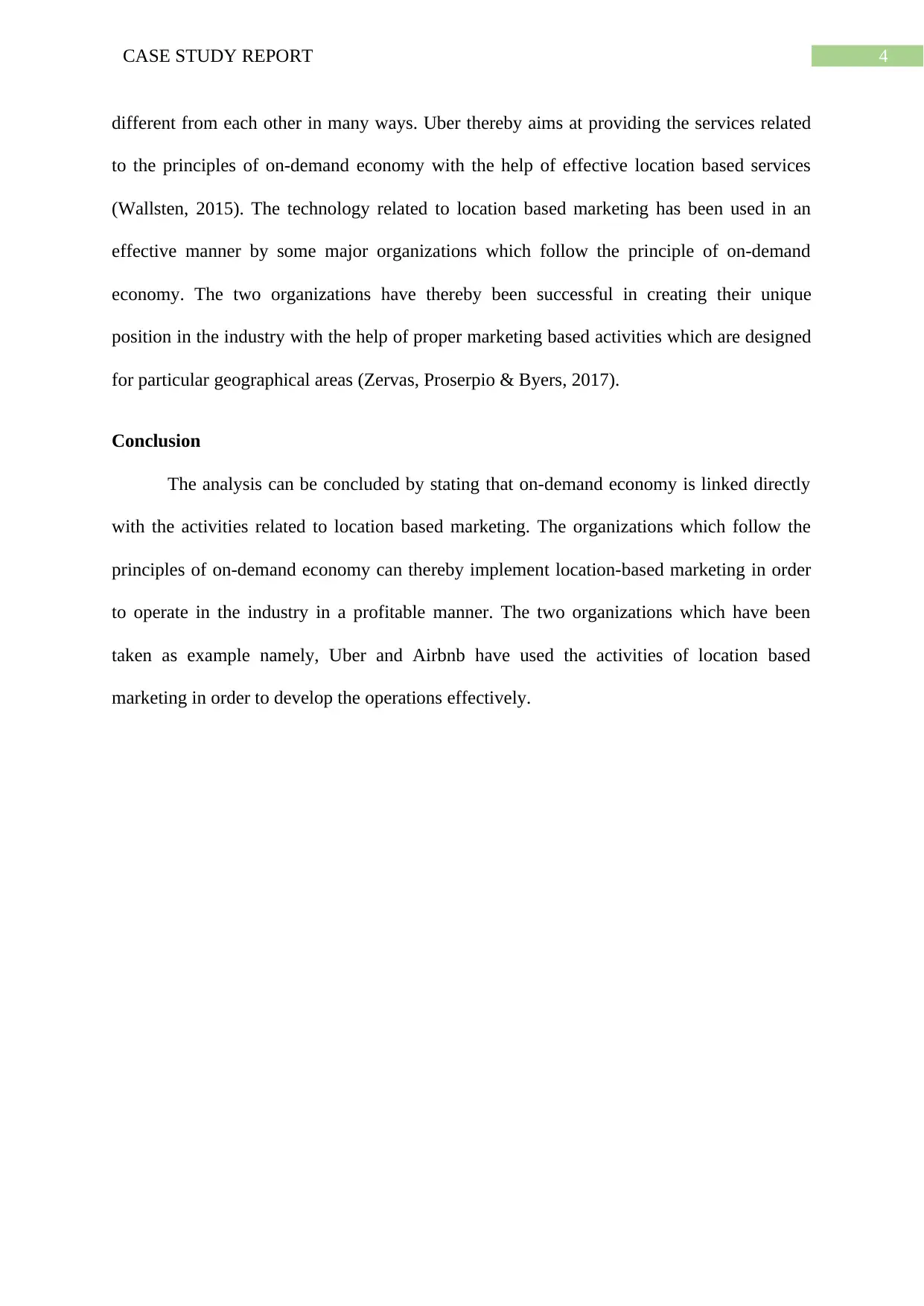
4CASE STUDY REPORT
different from each other in many ways. Uber thereby aims at providing the services related
to the principles of on-demand economy with the help of effective location based services
(Wallsten, 2015). The technology related to location based marketing has been used in an
effective manner by some major organizations which follow the principle of on-demand
economy. The two organizations have thereby been successful in creating their unique
position in the industry with the help of proper marketing based activities which are designed
for particular geographical areas (Zervas, Proserpio & Byers, 2017).
Conclusion
The analysis can be concluded by stating that on-demand economy is linked directly
with the activities related to location based marketing. The organizations which follow the
principles of on-demand economy can thereby implement location-based marketing in order
to operate in the industry in a profitable manner. The two organizations which have been
taken as example namely, Uber and Airbnb have used the activities of location based
marketing in order to develop the operations effectively.
different from each other in many ways. Uber thereby aims at providing the services related
to the principles of on-demand economy with the help of effective location based services
(Wallsten, 2015). The technology related to location based marketing has been used in an
effective manner by some major organizations which follow the principle of on-demand
economy. The two organizations have thereby been successful in creating their unique
position in the industry with the help of proper marketing based activities which are designed
for particular geographical areas (Zervas, Proserpio & Byers, 2017).
Conclusion
The analysis can be concluded by stating that on-demand economy is linked directly
with the activities related to location based marketing. The organizations which follow the
principles of on-demand economy can thereby implement location-based marketing in order
to operate in the industry in a profitable manner. The two organizations which have been
taken as example namely, Uber and Airbnb have used the activities of location based
marketing in order to develop the operations effectively.
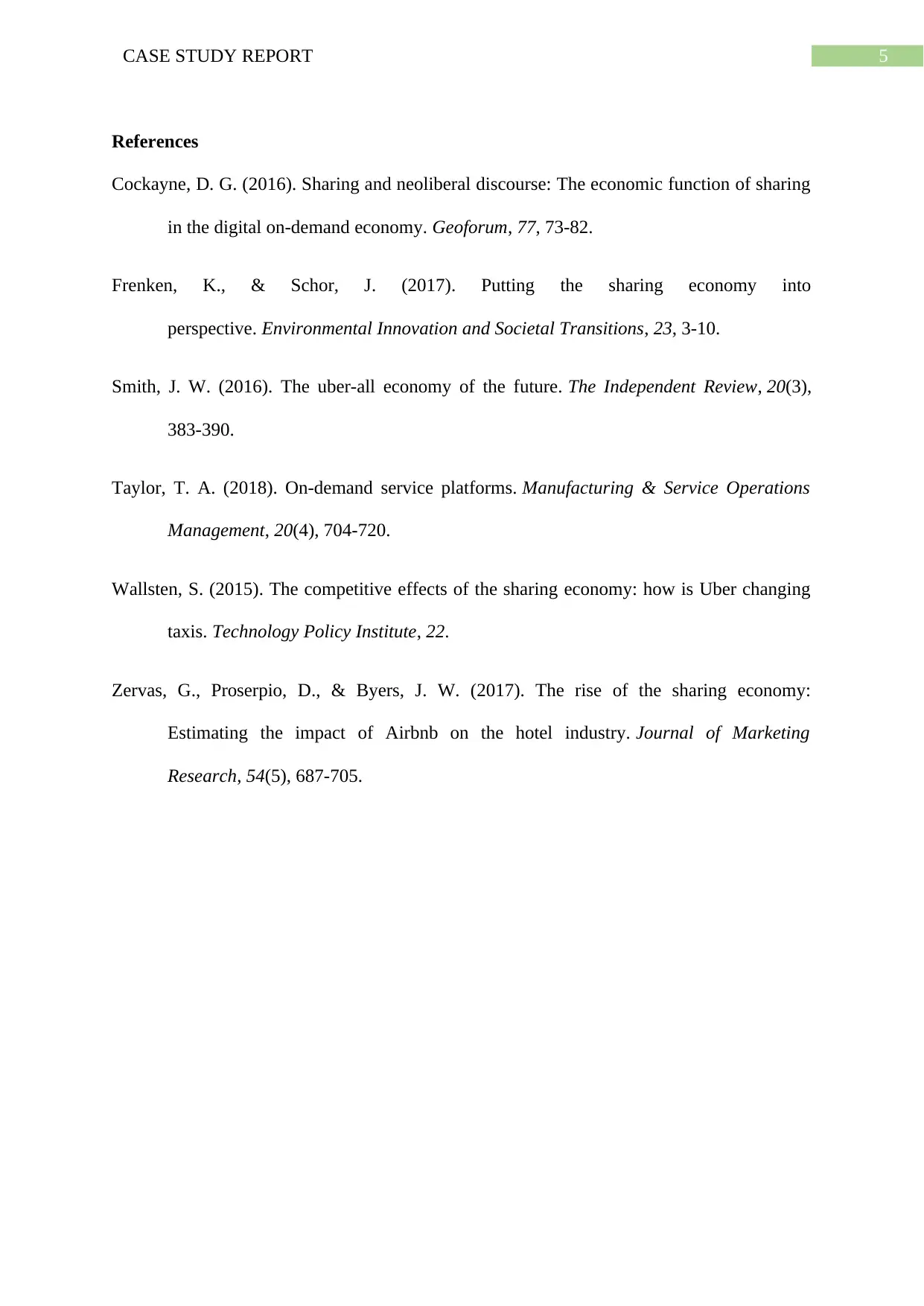
5CASE STUDY REPORT
References
Cockayne, D. G. (2016). Sharing and neoliberal discourse: The economic function of sharing
in the digital on-demand economy. Geoforum, 77, 73-82.
Frenken, K., & Schor, J. (2017). Putting the sharing economy into
perspective. Environmental Innovation and Societal Transitions, 23, 3-10.
Smith, J. W. (2016). The uber-all economy of the future. The Independent Review, 20(3),
383-390.
Taylor, T. A. (2018). On-demand service platforms. Manufacturing & Service Operations
Management, 20(4), 704-720.
Wallsten, S. (2015). The competitive effects of the sharing economy: how is Uber changing
taxis. Technology Policy Institute, 22.
Zervas, G., Proserpio, D., & Byers, J. W. (2017). The rise of the sharing economy:
Estimating the impact of Airbnb on the hotel industry. Journal of Marketing
Research, 54(5), 687-705.
References
Cockayne, D. G. (2016). Sharing and neoliberal discourse: The economic function of sharing
in the digital on-demand economy. Geoforum, 77, 73-82.
Frenken, K., & Schor, J. (2017). Putting the sharing economy into
perspective. Environmental Innovation and Societal Transitions, 23, 3-10.
Smith, J. W. (2016). The uber-all economy of the future. The Independent Review, 20(3),
383-390.
Taylor, T. A. (2018). On-demand service platforms. Manufacturing & Service Operations
Management, 20(4), 704-720.
Wallsten, S. (2015). The competitive effects of the sharing economy: how is Uber changing
taxis. Technology Policy Institute, 22.
Zervas, G., Proserpio, D., & Byers, J. W. (2017). The rise of the sharing economy:
Estimating the impact of Airbnb on the hotel industry. Journal of Marketing
Research, 54(5), 687-705.
⊘ This is a preview!⊘
Do you want full access?
Subscribe today to unlock all pages.

Trusted by 1+ million students worldwide

6CASE STUDY REPORT
1 out of 7
Related Documents
Your All-in-One AI-Powered Toolkit for Academic Success.
+13062052269
info@desklib.com
Available 24*7 on WhatsApp / Email
![[object Object]](/_next/static/media/star-bottom.7253800d.svg)
Unlock your academic potential
Copyright © 2020–2026 A2Z Services. All Rights Reserved. Developed and managed by ZUCOL.





